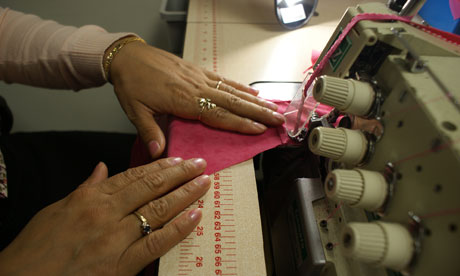Scheme offers refugees work and produces ethical underwear
A collective producing ethically-made pants offers women refugees the chance of work and boosts their self-esteem
 Whomadeyourpants? provides work and English lessons for refugees Photograph: Frederika Whitehead
Whomadeyourpants? provides work and English lessons for refugees Photograph: Frederika Whitehead It's a little after 11am and I am standing in the office of a Southampton factory unit with my trousers lowered while two women I have never met before discuss the design of my underwear.
"Two panels, two side seams, no top seam," concludes Samia, an Afghan in her late 40s, looking her companion directly in the eye.
Becky John is English and a little younger: "Marks & Sparks spring season last year," she says, nodding sagely. I am impressed. These women are connoisseurs of pants. They sit back and look thoughtfully at each other.
After a few moments John says: "Our new designs will be similar to this."
Three weeks later I speak to her on the phone. She assures me that their design problems are now solved: "Three panels instead of five. Three sewing steps instead of 12. We did the first trial run last week and it is just fantastic."
John founded the ethical knicker-making collective Whomadeyourpants? to strike two social ills in one hit: to provide work for marginalised women such as Samia and to offer an alternative to buying underwear made in sweatshops. Although it praised Marks & Spencer for its work to improve labour conditions, a recent report by Labour Behind the Label and War on Want said workers making clothes for all of the 25 UK high-street brands it surveyed were paid less than a living wage.
John – who previously sold corporate software for a living – says: "I've always loved underwear but I couldn't bear to buy knickers from a sweatshop. I came up with the name Whomadeyourpants? and that was it – I had to do it."
John befriended the marginalised women she wanted to provide work for, but had to convince them that her odd-sounding plan was viable and persuade them to attend lessons in English and sewing. She also had to raise funds.
Whomadeyourpants? opened in December 2009 as a workers' co-operative employing 11, along with nine trainees. About 80% of the women are refugees, and the other 20% were born in the UK but have various health problems that make it impossible for them to work full time.
Jasmine, the first range they produced, although very pretty, was too intricate to be profitable. After its launch, an industry insider sent John easier, more profitable, designs for their second range. The gift of the new designs has made the company viable in the long term, and prompted its staff to go about inspecting the pants of any willing stranger for the sake of comparison.
Today the collective operates out of a tiny, two-room factory and four small, office/teaching/social rooms. It's not a glamorous setting but the atmosphere is good. All the women I speak to tell me how happy they are to be there and how good it is to be out of the house and working.
"These are energetic women who had good jobs back in their home countries," says John. "Anyone who thinks about it for more than two seconds will realise that being stuck at home all day is bad for your mental health. Women in these situations often become profoundly depressed and, if I can do anything to help them, I will."
Samia, who correctly assessed the seams of my undies, describes how miserable she was when she arrived in the UK after fleeing Afghanistan where she used to run a restaurant beside a world heritage site. "Thirteen years ago, the situation in Afghanistan was good. Tourists came to my restaurant from all over the world," she says. "For three years after I came here I did not leave the house." So the one day a week she now works at Whomadeyourpants? is a lifeline. The co-operative has a waiting list of more than 40 women like Samia, who have little opportunity to work and spend most of their time at home, alone.
Batol, originally from Sudan, hopes to go on and become a team leader. "I like to do pants. I like my boss. She is very friendly. I hope we will go on and make other things and employ more staff and I will become a team leader. I hope to work in the office when this is a big company."
The collective has gone from strength to strength. This month it won a £60,000 grant from the billionaire philanthropist John Paul Getty Jnr's charitable trust, to be paid over three years. Each cheque will be smaller than the last, and John hopes the business will be self-sustaining by 2013.
The co-operative sells its products online only but hopes to get them into shops soon. John's vision of the future is global: "We want to follow Lush's model." The ethical cosmetics company which started out in Poole, Dorset, now has more than 600 stores in 43 countries. "Whomadeyourpants? has a really easy model that could be replicated up and down the country and worldwide. There are refugees and marginalised women in every country and everyone wants pants."
• Samia and Batol preferred not to give their surnames.
• This article was amended on 28 July 2010. The original used the name Samir instead of Samia and spelled Whomadeyourpants? founder as Becky Johns. These have been corrected.
http://www.guardian.co.uk/society/2010/jul/28/ethical-knickers-sweatshops-col...


0 Comments:
Post a Comment
<< Home